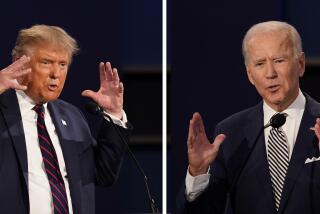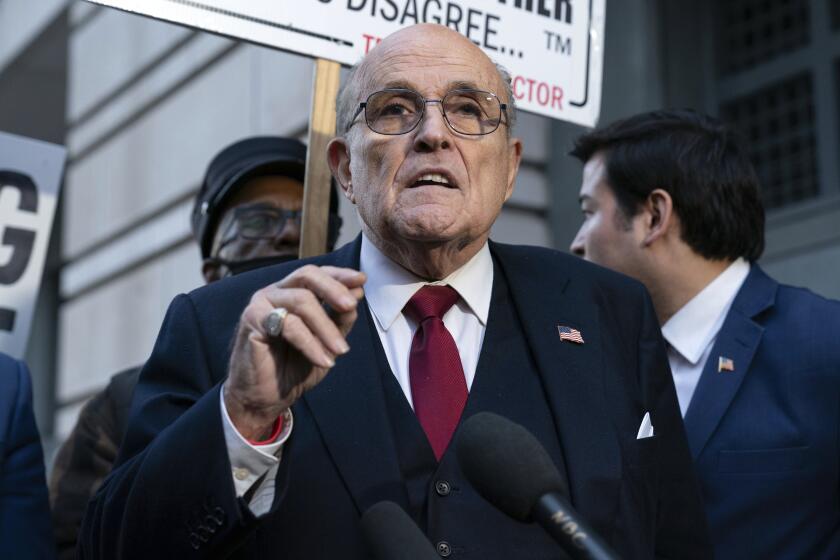Brown Eclipses Challengers in Oakland Mayor’s Race
Sunlight glints off speckled Formica. Bright signs hawk lottery tickets and the $3.45 breakfast special. The candidate gestures at his tiny audience, smacking the scraggly pothos plant behind him, emphasizing each and every point.
A mayor, he says, should have the power to overcome the gridlock that faces his fair city. A mayor, he exhorts, should make sure local residents get first crack at local jobs. A mayor, he insists, should make it his duty to ensure the safety of every constituent.
For the record:
12:00 a.m. May 30, 1998 For the Record
Los Angeles Times Saturday May 30, 1998 Home Edition Part A Page 3 Foreign Desk 1 inches; 28 words Type of Material: Correction
Oakland demographics--A May 27 Times story on the Oakland mayor’s race misstated the city’s racial breakdown. The population is 41% black, 26% white, 17% Latino and 16% Asian and Pacific Islander.
Not much new in this stump speech, except, perhaps, for the speaker. The man who lusts for the mantle of power in California’s struggling No. 8 city, a place with an inferiority complex as big as its harbor, is none other than former Gov. Edmund G. “Jerry” Brown Jr.
The man who ran for president three times, who worked side by side with Mother Teresa and dated pop star Linda Ronstadt, who changed the face of California government by appointing the first women and blacks to a governor’s Cabinet on this day is struggling to master the minutia of the municipal.
Trudging the diner and local library circuit, Brown fields questions about zoning ordinances and noisy police helicopters, about storm drains and panhandlers. He is reinventing himself yet again, and when he is through, democracy in Oakland may never be the same.
“He’s derailed our local process,” said Harry Jacobs, president of the Lake Merritt Business Assn. and host to Brown at a recent lunchtime forum. “But he’s added excitement to the race that might not otherwise have been here--and maybe hope. . . . It’s America. What can I say? We’re open to all kinds of things.”
An Instant Front-Runner
When Brown, 60, entered the race six months ago, he became the instant front-runner in a crowded field, a position he still enjoys. A March poll by the San Francisco Chronicle--the most recent available--placed him ahead of his 10 opponents with 38% of likely voters.
Who’s No. 2? The next-closest candidate, popular City Councilman Ignacio De La Fuente, is at 5%, an example of the Jerry Brown phenomenon: Famous man runs for local office and steals spotlight.
Sure, he’s brought national attention to a city that dwells in the shadow of San Francisco, its more glamorous neighbor across the bay. Sure he’s talked to everyone from “Nightline” to the New Yorker. But in doing so, he has transformed the electoral process here into what some critics have called “a cult of personality.”
When Brown runs against people such as De La Fuente, Alameda County Supervisor Mary King and Ed Blakely, dean of the USC School of Urban Planning and Development, he turns the mayor’s race into “a celebrity contest,” said Clinton Killian, an attorney and member of the regional transportation commission.
At a time when “Oakland is facing very serious and immediate problems, the level of debate is not raised by celebrity candidacy,” Killian said. “It’s being lowered.”
Having this big fish flop into their mid-sized pond has caused no end of annoyance to the other 10 men and women in the race, who find themselves running against Brown as much as they are running for mayor.
“Oakland doesn’t need a strobe light. It needs a guiding light,” said King, who rues the fact that her 22 years in local politics have disappeared in the glare of her far more famous opponent. “Jerry is a celebrity, so he’s by himself. Everyone else is lumped together, whether they’ve served or not.”
King’s latest campaign ad, which hit the mailboxes last week, shows a picture of a young Mary and her older sister, held in the arms of their proud parents and posed in front of a neat house on a sunny street in 1950s Oakland.
“For 79 years, my family has lived on Courtland Avenue,” King’s ad reads. “Jerry Brown hasn’t stopped criticizing Oakland since he got here three years ago.”
The two-time governor is indeed a relatively recent Oaklander, a white candidate who moved from San Francisco into this predominantly minority city of 388,000 in 1995 for the same reason most do: “It’s affordable,” he said.
He renovated a warehouse near the waterfront into a spare but elegant $2-million live-work space, home to his nonprofit organization, We the People, and complete with a broadcast facility for his radio show of the same name.
He threw himself into all things Oakland, lobbied unsuccessfully to become port commissioner, then announced his candidacy in October. Since then, he has attended nearly 100 small meetings at private homes, listening to what residents have to say about their city.
“People ask why, after you’ve been governor, do you want to be mayor,” he tells audience after audience as he stumps his way through town. “Everything that’s an issue in Oakland is what I’ve been working on all my life.
“Oakland is a city where people can have an impact, yet it’s a significant place. It’s a microcosm of the unfinished American agenda,” he says. “The civil rights movement has stalled. . . . You’re dealing with the multiracial, class stratified urban situation. . . . I think I can do something about it.”
But what? Unlike Blakely, who has a program for every problem, Brown has not done much more than identify--and voice--the concerns of Oakland’s citizenry, according to his critics.
“Oakland imports labor and exports capital,” is a favorite aphorism that wove its way through every speech on one recent campaign day. Two-thirds of all jobs here are filled by people who live outside the city, he complained, while only 70 out of 700 police officers live here.
“What would you do as mayor to change that?” asked Susan Wilson, a logistics officer for the U.S. Postal Service. “Would it be a requirement for an applicant to be a resident?”
That’s unconstitutional, he answered. “But you can recruit and train and motivate the people who live here.”
In addition to supporting local labor, Brown is pushing a so-called strong mayor ballot measure that would allow the city’s top official to hire and fire the city manager and be more than just what the candidate derides as “a ribbon cutter.”
Voters go to the polls June 2. If none of the 11 candidates wins 50% plus one vote, the top two finalists will face off in November.
So far, residents have not held Brown’s slight fuzziness against him, said Oakland-area Assemblyman Don Perata, in part because Brown projects what people want in a leader: forcefulness and opinions.
“The opinions are about the problems, not the solutions,” Perata said. “But he’s not being held accountable. Frankly, the longer the campaign goes on, the more I understand why Jerry is having an impact on people. He is a celebrity. He has this powerful presence. He is saying what’s on peoples’ minds, saying, ‘Aren’t you tired of having gunfire in your neighborhoods?’ ”
Listen to the candidate: Oakland is on the verge of some very great things, but it’s never gotten off the verge. . . . Muggings, car break-ins, burglaries, this is real, no matter what anyone says. . . . The city has to ensure your safety. . . . Any administration that can coexist with an increasing number of people locked up in their own homes is not doing its job. . . . There’s a big image problem.
While opponent De La Fuente says “the first thing I’d do to improve the image of the city is to tell Jerry Brown to shut up,” Brown’s candidacy has resonated here.
He may be the only white candidate in a field of 10 African Americans and Latinos, in a city whose population is 42% black, 34% white, 17% Latino and 16% Asian American. He may be a newcomer. But to many voters he offers an oxymoronic combination of freshness and experience that they find appealing.
“Oh, man, there’s a lot of candidates out there,” said longtime East Oakland resident Richard Allison, who works in manufacturing in the Silicon Valley. “I would probably vote for the one with the most experience--Jerry Brown. He has a lot of clout statewide and the connections to give the city what it needs--a shot in the arm.”
More to Read
Get the L.A. Times Politics newsletter
Deeply reported insights into legislation, politics and policy from Sacramento, Washington and beyond. In your inbox three times per week.
You may occasionally receive promotional content from the Los Angeles Times.







